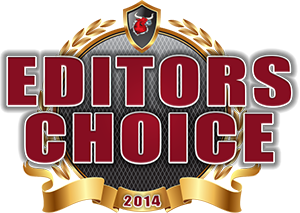
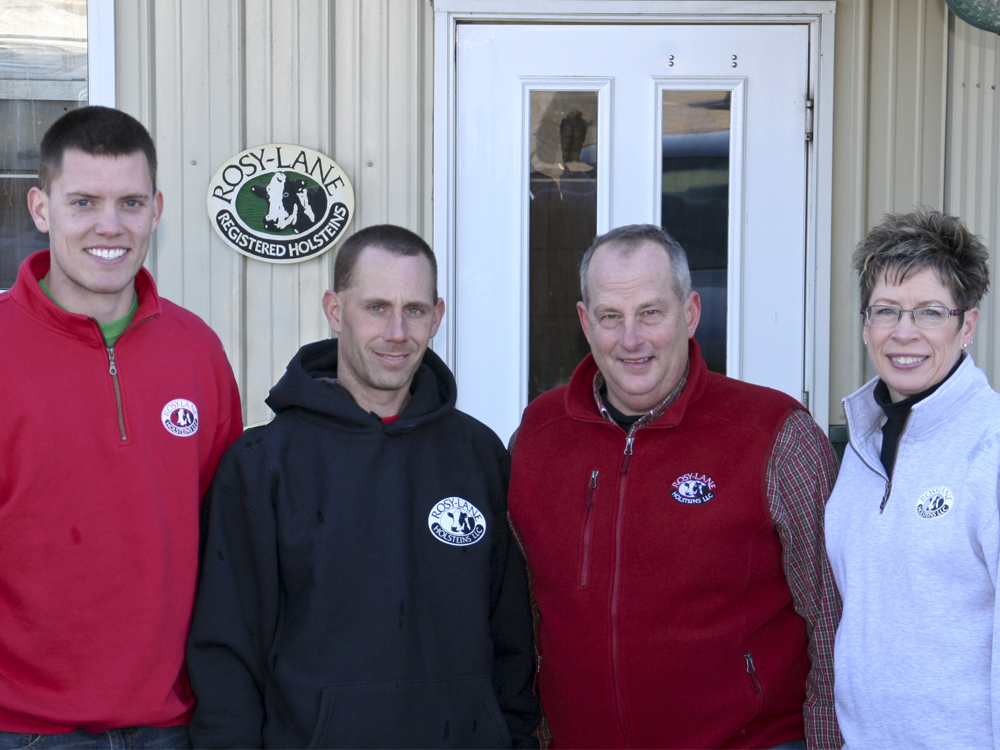
Four partners at Rosy-Lane Holsteins: Jordan Matthews, Tim Strobel, Lloyd Holterman, Daphne Holterman
The Milky Way to Rosy-Lane
Lloyd Holterman looks back to growing up on a 50-cow registered Holstein farm. “My parents Lloyd A. and Rosemarie Holterman focused on high production. I graduated from the University of Wisconsin – Madison in 1980 in Dairy Science and was a member of the Dairy Cattle Judging Team there.” explains Lloyd. “I married Daphne in 1981 and we partnered with my parents for 6 years, went on our own for 2 years, then returned to the home farm to take over and purchase the herd in 1989.” He brings the story to the present day. “We currently have 920 total cows and 870 youngstock. We grow 1,600 acres of forage and do some custom harvesting. Genetic sales account for 1-5% of gross revenue, depending on the year.” That simple summing up barely skims the surface of this well-run dairy operation that hosts classes, seminars and visitors from within the dairy industry and from the broader consuming public. The Holterman’s are dedicated dairy Agvocates as well as very successful dairy farmers. All tasks at Rosy-Lane are thoughtfully considered and thoroughly implemented.
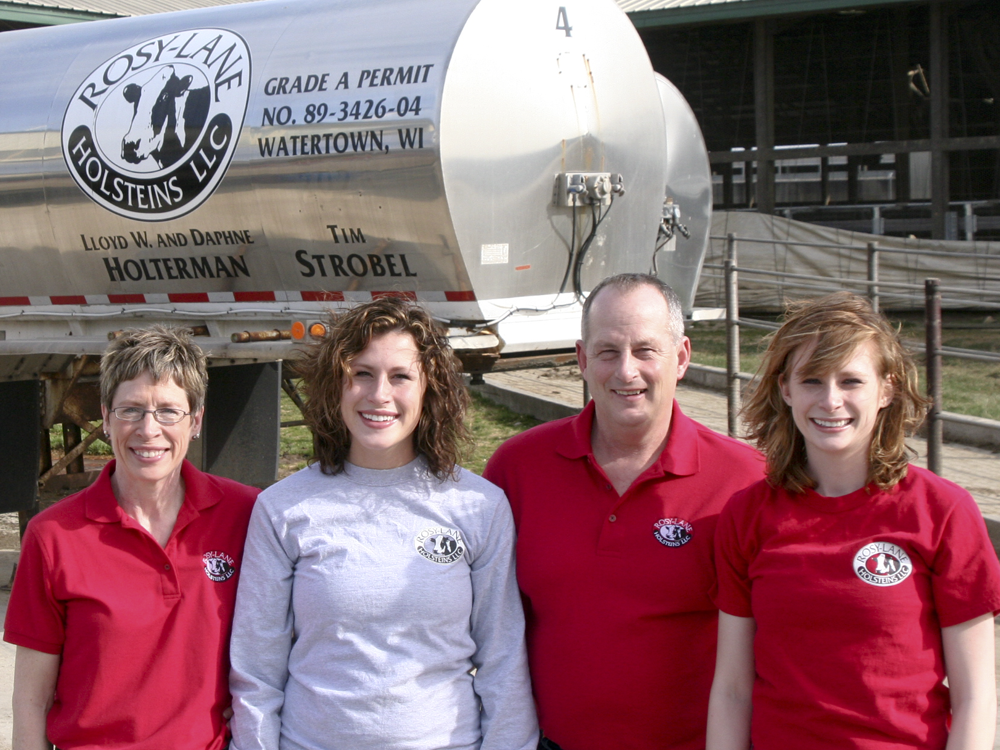
Holterman Family (L to R; Daphne Lauren Lloyd Taylor)
At Rosy-Lane They Minimize AND Maximize to Avoid Tall, Pretty and Infertile
Lloyd states the first step in Rosy Lane Holstein’s operating strategy. “Profit comes first as farming is a business.” Far from the negative connotations such a goal sometimes earns, Lloyd points out that efficiency is key. “While it’s great to sell one animal for big dollars, the genetic program should be an investment in growing future earnings and genetic selection must maximize: feed efficiency (through high producing healthy cows); Labor efficiency (through high producing healthy cows) and Capital efficiency (through high producing healthy cows).
The link between efficient dairy management and health productive cows is one that Rosy Lane gives the highest priority.
At the opposite management extreme, at least from the size viewpoint, is the goal that genetic selection must also minimize key parameters: Herd health cost per cwt.; death loss across ALL ages; calves born DOA and days open.”
With this clear vision of desired outcomes, Lloyd outlines how the strategy is carried out at Rosy Lane. “The best tool to do this (minimize and maximize) is NM$ or CM$ (Cheese Merit). Living in Wisconsin, our income is highly dependent on component pricing (Class III).” He briefly considers an alternative. “TPI also has it strengths but if you aren’t careful, you can end up with Tall, Pretty and Infertile.”
Three Decades of Distinguished Rosy-Lane Dairying
Such a clearly stated perspective on dairying has been achieved over many years reports Lloyd. “Daphne and I started farming with zero dollars and two college degrees. In 33 years, we have built a sound business that we are now transitioning to two young men that both started working with us before they were 16 years old. It’s interesting to note that neither of them grew up on dairy farms. One of the key points in our farm mission statement is to: Maintain an economically-viable business unit with future potential. We are well on our way to accomplishing this.” While they put extreme emphasis on the daily details they are always building for the future.
There Must Always be Time to Grow, Connect and Learn
At Rosy-Lane they feel there is always something to learn from mentors who, both near and far, have been many and well-valued. Lloyd points out the ones that he found to be the most influential. “Pete Blodgett called it as he saw it and was one of the first to realize cows were too tall-narrow-thin-lame. Another is George Shook, University of Wisconsin-Madison genetics professor, whose Dairy Cattle Breeding – Genetics 460 class still sticks with me every day. His class was a good background to understand genomics.” Lloyd appreciates other successful dairymen. “Don Bennink, North Florida Holsteins, was an early proponent and visionary on health traits, as well as breeding cows for a profit.” Sometimes the mentors are of a very practical nature. “Gustav Wilke, Osnabruck OHG in Germany, pointed out that Ramos would be a good compliment to our program that emphasized Oman. He also brought the European perspective.” Other consultants earn praise as well. “Susie Martin, ABS Global Sire Analyst, always brings balanced recommendations to our program and points out bulls we might otherwise overlook.” Others have influenced the very strategy Rosy-Lane has developed. “Denny Funk, University of Wisconsin-Madison Dairy Science Dept., started us on NM$ and productive life.” Of course, the valued advice from family is well-appreciated by Lloyd and Daphne, says Lloyd. “My brothers Bob Holterman, Gary Holterman, my father Lloyd A. (Sr.) and father-in-law Ray W. Johnson (Angus breeder) also have influenced our outlook and have given us the opportunity to meet and interact with leaders and visionaries of the cattle industry.” These mentors are a who’s who of dairy advice and wisdom and yet Rosy Lane is not a typical farm by any means!
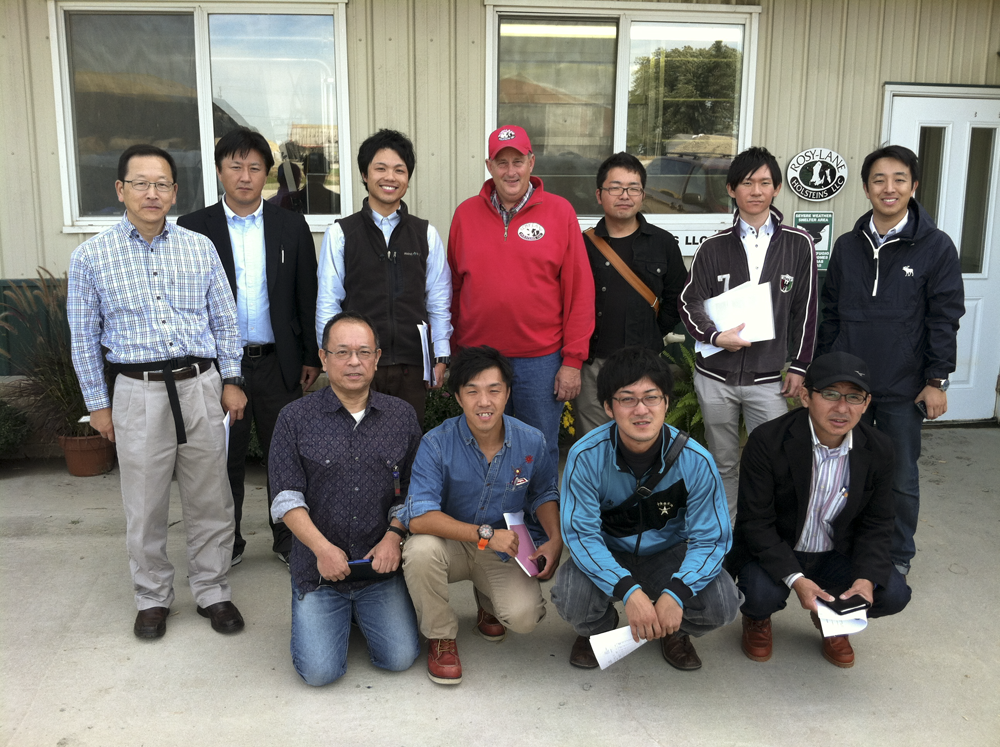
Strong Agvocates, Rosy-Lane Holsteins is frequently hosts tours from local schools to producers from around the world.
Rosy-Lane Holsteins. Unqualified Success! Unclassified Too!
When you first learn that Rosy Lane does not classify their herd, it seems counter-intuitive to what many traditional dairy breeders would consider necessary. Lloyd, as expected, has a well-reasoned explanation of their choice. “We participated in Holstein’s classification program for many years but it became increasingly clear that the program’s return on investment was negative. Cows that are tall, narrow and refined are generally scored higher than shorter, wider, heavier cows. Worse yet, the “shorter” cows are penalized on dairy form and udder depth because they are short and carry some condition. We had a majority of these “shorter” cows, and we found they far outlived their higher-scoring herd-mates while having less foot problems and better fertility. The classification program definitely punished Oman (we had about 550 of his daughters in our herd at any one time).” Returning to the businesslike approach that is the backbone of their success, Lloyd gives supporting examples. “Our farm runs on economics, and Oman was a bull that helped make our business profitable: 3 on calving ease, more live calves and fewer problems at 1st calving. Number 1 NM$ for several years. High DPR. Great foot health and Low SCC.” Rosy Lane made the logical, for them, choice. “It became obvious to us that scoring our “shorter” cows was as a waste of money. Looking back, that decision to stop classifying should have been made much sooner because a business should only consider long-term profit and viability, not how high individual cow scores are. Functional cows with good health, good feet and legs, balanced udders and high milk production make money.” Always able to clearly explain the decisions that have built Rosy Lane, Lloyd is well-prepared in explaining what is needed for successful cattle breeding. “To maximize profits in the future, modern cows will need to:
- Produce more MARKETABLE milk (less cows dumped)
- Breed back in 1 or 2 services
- Resist mastitis
- Hold components at peak production
- Produce more live calves and
- Calve younger to reduce rearing costs
In 2013, we marketed 1.69 lbs. milk for each 1 lb. dry matter TMR fed. This can’t be achieved if there are problems at calving such as mastitis, DA’s, ketosis, and rampant lameness. From Jan. 1, 2014 to May 8, 2014 (128 days) we had 75 days when no cow was treated or dumped so 100% of the milk harvested was marketed. While this may be common on small herds, we milk 800-830 through our double-12 parlor 3X a day, achieving 94 to 100 lbs. milk average per cow per day.” With no apologies, Lloyd sums up their success, “We feel our genetic program is a central part of achieving these numbers.”
Breed Cows for Profitability
There are always clear goals for the future. “Daughters of Dean, Monarch, Supersire and Cabriolet will be flushed soon from the home herd. They were selected because they are high NM$ with the balance of traits we are looking for: Fat, Protein, DPR, SCC, CE and moderate stature with good strength.” He is enthusiastic about impending successes. “With our daughter Lauren, we purchased a Mogul x Freddie over 900 NM$ from Don Bennink and transferred 15 JoSupers recently. She is a very balanced heifer. We didn’t use Mogul ourselves and she had good CE and DPR.” (Rosy-Lane recently had the #2 high seller, Rosylane-Llc Oak 7276 the #23 gTPI female in the breed,who sold for $176,000 at the Day at the Derby Sale)
Over and Under: “Use ALL the Tools. Set your Benchmarks.”
| ROSYLANE GENERAL BREEDING STRATEGY | |
| We sort by Net Merit FIRST | |
| Then Discriminate Against Bulls Over | Discriminate Against Bulls Under |
| +2.0 Stature | 850 NM$ |
| 8.0 Calving Ease | 50# P |
| 2.8 SCC | 60# F |
| +1 DPR | |
| +5 PL | |
Lloyd continues. “Then we try to find unrelated bulls for our female population. This is the general strategy and exceptions to the above are made. ABS helps us from time to time with their computer inbreeding program.” He outlines bulls that Rosy Lane has used. “Manfred, Oman, Ramos, Shottle, Freddie, and Jeeves have been most successful for us. And now Bookem & Gonzo on 2-year olds. By increasing accuracy, we are able to select flush animals and recipients. We are now able to correctively mate for health traits, along with production traits, and correct any shortcomings on individuals more aggressively, such as those with low DPR or high calving ease.”
“We Use Genomics For Impact”
Genomics has greatly increased selection accuracy and given the industry the chance to find both health trait genes and, on the other side, avoid detrimental haplotypes. We can also find badly-needed outcross bulls more quickly. The timing coincides with consumers who are demanding less drugs/hormones be used, so we now have better tools to produce the kind of cattle that have lower “health care” costs. In our herd, genomics gives us more options to reduce inbreeding and select for superior health traits earlier.”
Lloyd reports on sire usage. “Genomic sire usage: Supersire, Cabriolet, Rodgers, JoSuper, Dean and Halogen. Why? They meet our sire criteria and can be used across the herd. We didn’t use Robust; we use his sons and grandsons. Planets are not holding up for us in the long run so we are trying to reduce his influence to some degree. Proven sire usage: Freddie. Why? Our best young cows are Freddies. They calve easily, have great F&L, low SCC and high components. Overall, they are very trouble-free. “
At Rosy-Lane, they are also well aware of the success being achieved by other dairy breeders and are careful observers of what they term influencers from afar. Lloyd reports that they closely watch the programs through genomic lists for the following herds/prefixes:
- De Su
- Cookie Cutter
- Welcome Stock Farm
- Spruce Haven
- Coyne
- Bush Bros.
- Hendel
“Imagine The Perfect Rosy-Lane Cow!”
Far from being afraid of the future, Lloyd welcomes the challenges. “The trend toward larger operations will continue, driven by higher tax rates. Our capitalistic system is increasingly becoming a ‘winner take all’ (not necessarily a bad thing). Genetics will become more important because in the end it is the most cost effective long-term solution to reduce costs.”
Never one to wait for the future, Lloyd already has imagined the perfect cow. “Imagine a cow that calves easily like an Oman, has a disposition like a Shottle, breeds back like a Ramos, milks like a Planet and has the immune system of a Duster. In our herd, feed efficiency would improve quickly from 1.69 to 1.78 and we would make tremendous genetic progress with the ability to PICK our culls. This concept has been nearly lost on the Holstein genetic ‘community’. And then people wonder why commercial dairymen crossbreed or switch to Jerseys. If we don’t get with it now, Jerseys’ market share will soon be 50% and North American Holsteins (yes, Canadian Holsteins too!) will have to compete on cost only and may go the way of the Guernsey. Is this where we want to go?”
“Follow your Passion. Don’t Follow the Herd.”
Regardless of the area of dairying that is giving you challenges, you can learn a lot about solving problems from Rosy-Lane Holsteins. Despite the ‘rosy’ farm prefix this operation never chooses to wear rose-colored glasses. Of course, the day may come when everyone unites with a common vision for a sustainable and profitable dairy industry. “When that happens” you might suggest, “perhaps even Rosy-Lane will follow the herd. Wrong!” Lloyd Holterman points out, “That sheep-like mentality only works if it meets your profitability goals. Dairying is a business.”
The Bullvine Bottom Line
Lloyd Holterman gives heartfelt advice to young dairy hopefuls. “Do what you have a passion to do, if you haven’t found it yet – keep looking!” Trying to imitate someone else’s passion is a sure way to be unsuccessful. However, he cautions those who have encountered hurdles “Don’t blame others if you fail.” Whiners and complainers are rarely at the forefront of innovation and success. It’s your life. Your future. Seek out the positive. Rosy-Lane Holsteins has excelled at dealing with negative circumstances and people. “Listen to the naysayers and do just the opposite!”
Get original “Bullvine” content sent straight to your email inbox for free.

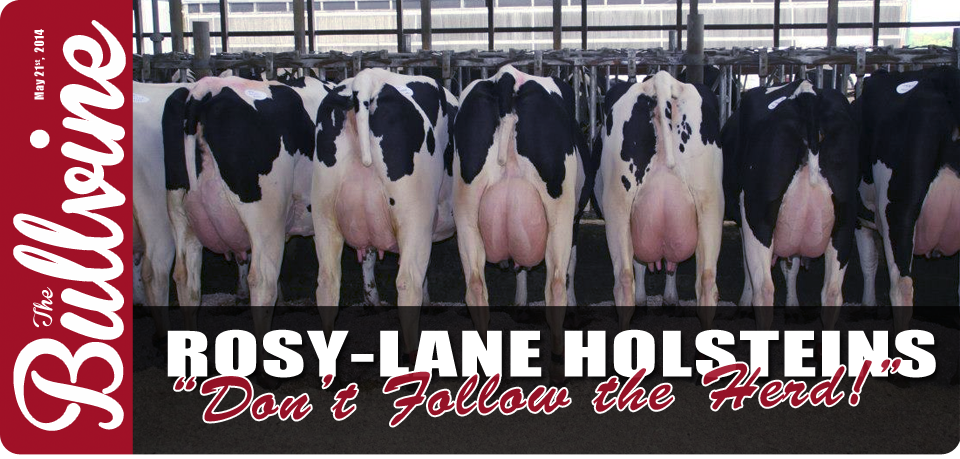
















Leave a Reply
You must be logged in to post a comment.